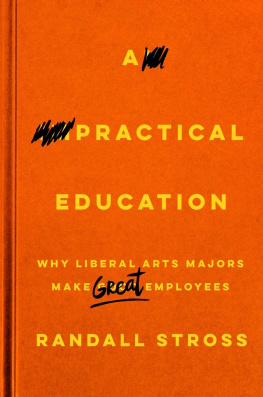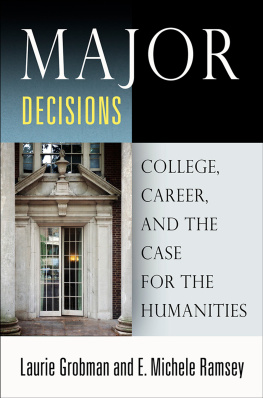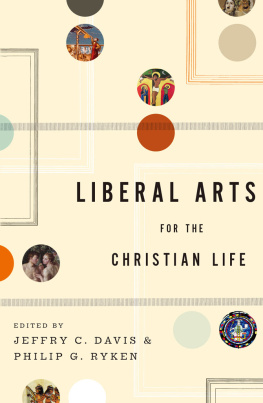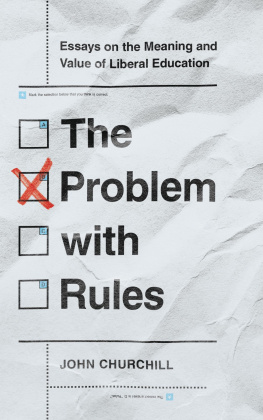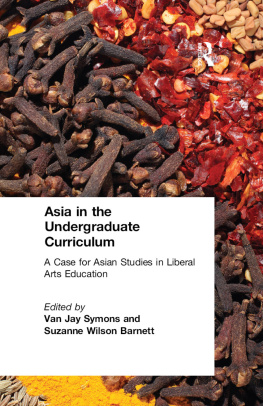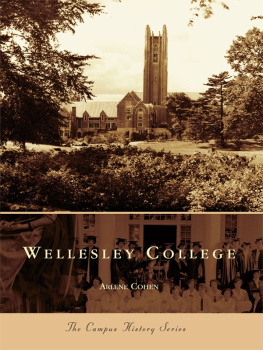Stanford University Press
Stanford, California
2017 by Randall Stross. All rights reserved.
No part of this book may be reproduced or transmitted in any form or by any means, electronic or mechanical, including photocopying and recording, or in any information storage or retrieval system without the prior written permission of Stanford University Press.
Printed in the United States of America on acid-free, archival-quality paper
Library of Congress Cataloging-in-Publication Data
Names: Stross, Randall E., author.
Title: A practical education : why liberal arts majors make great employees / Randall Stross.
Description: Stanford, California : Redwood Press, 2017. | Includes bibliographical references and index.
Identifiers: LCCN 2017022289| ISBN 9780804797481 (cloth : alk. paper) | ISBN 9781503603790 (electronic)
Subjects: LCSH: Education, HumanisticUnited States. | College graduatesEmploymentUnited States. | Employee selectionUnited States. | College majorsUnited States. | Stanford UniversityAlumni and alumnaeEmployment.
Classification: LCC LC1023 .S77 2017 | DDC 370.11/20973dc23
LC record available at https://lccn.loc.gov/2017022289
Typeset by Bruce Lundquist in 11.5/15 Baskerville
A PRACTICAL EDUCATION
WHY LIBERAL ARTS MAJORS MAKE GREAT EMPLOYEES
RANDALL STROSS

REDWOOD PRESS
Stanford, California
ALSO BY RANDALL STROSS
The Launch Pad: Inside Y Combinator
Planet Google: One Companys Audacious Plan to Organize Everything We Know
The Wizard of Menlo Park: How Thomas Alva Edison Invented the Modern World
eBoys: The First Inside Account of Venture Capitalists at Work
The Microsoft Way: The Real Story of How the Company Outsmarts Its Competition
Steve Jobs and the NeXT Big Thing
Bulls in the China Shop and Other Sino-American Business Encounters
The Stubborn Earth: American Agriculturalists on Chinese Soil, 18981937
To
Emily, Hal, and Van
CONTENTS
CHAPTER 1
THE MAJOR DECISION
STANFORD UNIVERSITYS UNDERGRADUATES are a most fortunate group. Having been admitted to the most selective undergraduate school in the country and installed on an Edenic campus, they could not be any closer to Silicon Valley. Only a stones throw or two beyond the edge of campus sit tech giants and tech adolescents and tech startups, which surveys anoint as the most desirable prospective employers in the world. Stanford undergraduates would seem perfectly positioned to approach their graduation without worry about what comes next.
The most sought-after students are the engineering majors, whose ranks have grown significantly in recent decades. But this is a book about the students who did not choose an engineering major, who instead chose majors for the joy of studying a subject that does not lead to a well-marked occupational destination. Their majors belong to the universitys School of Humanities and Sciences, and many of these students face considerable uncertainty about their futures if they immediately seek professional positions without an advanced degree. For this book I have collected oral histories from their ranks, chronicles of the education, job searches, and initial work experiences of recent graduates. Ive gathered enough of these histories to convince me and, I hope, convince others that graduates with these majors are well-equipped to land well and to thrive, if employers are willing to give them the chance.
I grant that the students who are profiled here, for the most part, come from privilege. Their parents, many of whom went to Stanford themselves, are financially comfortable. They sent their children to excellent primary and secondary schools and permitted their children, when they got to Stanford, to follow their own interests when choosing their majors. I understand that these students are not a random sampling of college students: these graduates are exceptionally smart and, let us not forget, are the champion go-getters of their age cohort. But they are not the only college students who are smart strivers; every college and university has such students. Whatever claims I make about the quick-learning capabilities of the students I followed at Stanford would apply to these other students, too, the ones who defy the ambient advice to major in business or an applied technical field, who instead major in a field that they genuinely enjoy studying and who excel in their classes.
I dont make a blanket claim that every student, at every college or university, who elects a liberal arts major will, ipso facto, make an outstanding employee upon graduation by dint of enrolling in the courses and earning passing grades. But those students who do choose for a major an academic field that is not tightly connected with a particular career and who do well in those courses, who demonstrate a sponge-like capacity to absorb new knowledge, whose academic record shows drive and diligence and a capacity for thinking hard and communicating well, should be seen by prospective employers as the multicapable candidates that they are.
If I am to persuade anyone of the practicality of the liberal arts, whether it be future employers, current college students, or the students anxious parents, I need to be able to show actual liberal arts majors who are doing well in the workplace. This is why I have chosen to focus on Stanford only. Silicon Valley employers love Stanford graduates, even to the extent that they have been willing to take a chance on liberal arts majors from Stanford. For the most part, the graduates are not hired because of their choice of major but despite it. They were hired in many cases with the help of Stanford alumni connections. But what matters is that they managed to get in the door. Once they did, they were able to demonstrate the broadly useful strengths that characterize those who choose the liberal arts. Their employers then recognized their contributions, which were concrete and not related to the alumni networking, and gave them increased responsibilities, and that led to more achievements. These stories would have remained nothing but wishful hopes had the employers turned away majors that on their face had no relevance to the business. The Stanford tie is what sets the stories in motion, but what transpires once the job is secured speaks to the skills that liberal arts majors bring to their employers, skills that are sharpened in the course of majoring in the liberal arts wherever one earns a bachelors degree.
This book also includes an abridged, episodic history of Stanford University, focusing on the tension between vocational and nonvocational directions that was present at its founding, and on the evolution of career counseling and post-graduation job placement. Immersion in this history will reveal how employers have rather arbitrarily changed their minds, again and again, about how and when they would like students to specialize in their undergraduate studies. One field becomes hot, and then it falls out of favor, replaced by another. The employers message to undergraduate students is likely to continue to shift in the future, which suggests to me that the best preparation for an unknowable future is one that has been tested over time as universal preparationthat is, the liberal arts.
It is difficult, to be sure, to make this case in the face of considerable evidence that prospective employers of new graduates are far more keen to hire those with majors that are infused with quantitative skills or constitute an occupation-specific field, consigning far more liberal arts majors than engineering majors to first jobs that fit the labor economists definition of underemployed.
Next page
